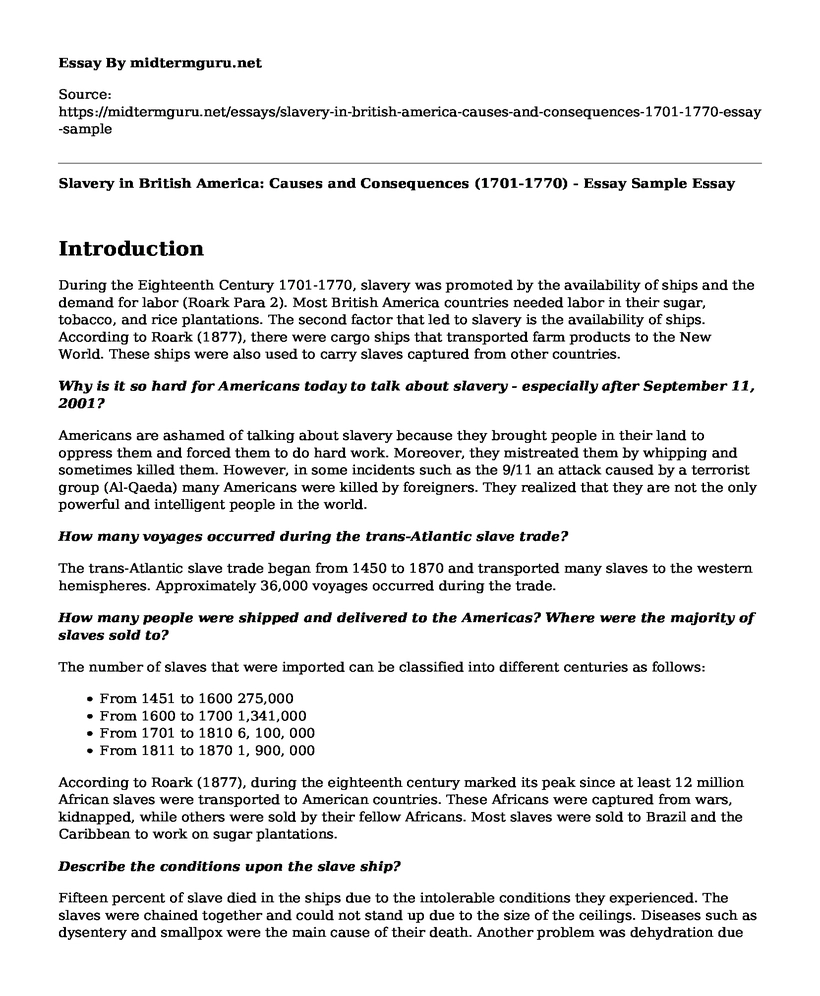Introduction
During the Eighteenth Century 1701-1770, slavery was promoted by the availability of ships and the demand for labor (Roark Para 2). Most British America countries needed labor in their sugar, tobacco, and rice plantations. The second factor that led to slavery is the availability of ships. According to Roark (1877), there were cargo ships that transported farm products to the New World. These ships were also used to carry slaves captured from other countries.
Why is it so hard for Americans today to talk about slavery - especially after September 11, 2001?
Americans are ashamed of talking about slavery because they brought people in their land to oppress them and forced them to do hard work. Moreover, they mistreated them by whipping and sometimes killed them. However, in some incidents such as the 9/11 an attack caused by a terrorist group (Al-Qaeda) many Americans were killed by foreigners. They realized that they are not the only powerful and intelligent people in the world.
How many voyages occurred during the trans-Atlantic slave trade?
The trans-Atlantic slave trade began from 1450 to 1870 and transported many slaves to the western hemispheres. Approximately 36,000 voyages occurred during the trade.
How many people were shipped and delivered to the Americas? Where were the majority of slaves sold to?
The number of slaves that were imported can be classified into different centuries as follows:
- From 1451 to 1600 275,000
- From 1600 to 1700 1,341,000
- From 1701 to 1810 6, 100, 000
- From 1811 to 1870 1, 900, 000
According to Roark (1877), during the eighteenth century marked its peak since at least 12 million African slaves were transported to American countries. These Africans were captured from wars, kidnapped, while others were sold by their fellow Africans. Most slaves were sold to Brazil and the Caribbean to work on sugar plantations.
Describe the conditions upon the slave ship?
Fifteen percent of slave died in the ships due to the intolerable conditions they experienced. The slaves were chained together and could not stand up due to the size of the ceilings. Diseases such as dysentery and smallpox were the main cause of their death. Another problem was dehydration due to lack of water and fluid loss from lack of water, diarrhea, and vomiting. Moreover, they also died from heat and lack of oxygen because they were kept on lower decks.
What instruments and methods were used to control and enslave Africans on the ship?
Africans were chained together in a way that they cannot stand upright. The size of the ceiling was short limiting their movement. Starvation was another method used to control slaves because it made them weak. Resisting slaves were also whipped by the traders.
How slaves resisted their captors on the slave ship?
The slaves confronted the captors by fighting with them and insurrections. Women and children kept on crying and screaming to avoid mistreatments such as rape. Some slaves resisted slavery by taking their lives where they jumped into the sea. Some died o hunger and dehydration because they refused any refreshments given by the captors.
Once on the plantation, what were some of the methods and ways in which slaves resisted/fought back against their masters' autonomy? What was the most common method of resistance?
In the plantations, slaves resisted through various acts of insubordination, sabotage, and theft. In some instances, the slaves got hold of arms and they used them to free themselves. They engaged in violent resistance by fighting back the landowners. The slaves faked illness or played dumb so that they did not follow what their owners wanted. Moreover, they turned to self-mutilation and suicide.
How was possible that illiterate slaves became exposed to the ideals of freedom, natural rights, and equality from the American Revolution?
The slaves realized that they are humans like their masters and can change their lives and achieve their freedom. Sometimes slaves were taught by children because education was discouraged to them. They become exposed to the ideas of freedom when slave abolitionists-such as Fredrick Douglas. They were treated differently because they were black and they were denied their rights and therefore in their speeches they were fighting for equal rights to be granted to the blacks. The church also played a significant role by enlightening of slaves about their natural rights. It also taught that everyone whether black or white is equal in the eyes of God.
What impact did the American Revolution have on slaves in their quest for freedom?
The American Revolution encouraged the slaves to fight for their freedom just as the American fought against colonialism. Some slaves also attained their freedom by participating in the revolutionary war.
Do you think it is correct to describe slavery as a crime against humanity?
Slavery is a crime against humanity because it involves torture, cruel and mistreatment of humans. it also denies people their right of movement because the slaves are confined in a specific place and cannot move around without the master's permission. Slavery also denies people their right to choose a place of residence hence it is a crime against humanity.
Work Cited
Roark, James L., et al. The American Promise, Volume I: To 1877: A History of the United States. Macmillan, 2012.
Cite this page
Slavery in British America: Causes and Consequences (1701-1770) - Essay Sample. (2023, Feb 07). Retrieved from https://midtermguru.com/essays/slavery-in-british-america-causes-and-consequences-1701-1770-essay-sample
If you are the original author of this essay and no longer wish to have it published on the midtermguru.com website, please click below to request its removal:
- The Holocaust and Auschwitz Concentration Camp
- Paper Example on Donor Behavior
- Thoughts on Race, Culture and Class - Synthesis Essay
- Couple Counseling: Case Study
- Introduction to Public Opinion and Propaganda - Research Paper
- Social Networks: Acquiring Information, Exchanging Ideas - Research Paper
- Research Paper on African Americans and the Criminal Justice System







